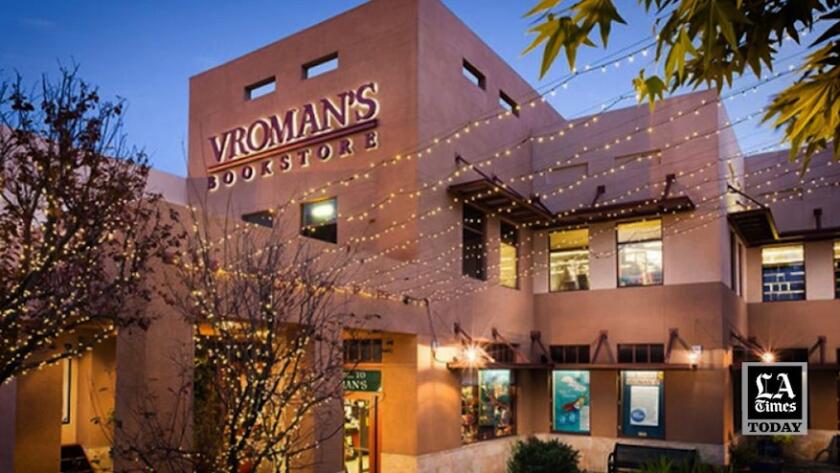LA Times Today: Patt Says - Vroman’s
Watch L.A. Times Today at 7 p.m. on Spectrum News 1 on Channel 1 or live stream on the Spectrum News App. Palos Verdes Peninsula and Orange County viewers can watch on Cox Systems on channel 99.
Is there any part of our lives that hasn’t been sent off the rails by coronavirus?
Some of them are obvious – school, work, family.
But what about the other shared institutions that underpin our society … that define who we are … like sports, for one?
The Dodgers and the Lakers, playing their hearts out, to the sound of no hands clapping – no fans there to cheer them on.
And museums and stage plays? The drive-through museum, the online performance – they’re heroic and they’re inventive, but they don’t give us that tribal sense of reaction and response that’s as much a part of the creative process as the painting or play itself.
And bookstores. Bookstores are at the very heart of community life.
They’ve been beaten up and left for dead by Amazon … by discount chains … by eBooks and Kindle … and now by a virus keeping people out of the stores.
The poster child for this is Vroman’s Bookstore in Pasadena. It’s a landmark on our cultural landscape, and it’s asking its patrons to help it survive.
I’m not here to play Peter Pan to Vroman’s Tinkerbell, but Vroman’s has been in business since 1894 -- when Mark Twain and Frederick Douglass were still alive, and before Ernest Hemingway and Scott Fitzgerald were even born.
It is a place where famous writers and eager readers gather to discover and talk about books.
It is the oldest independent bookstore in Southern California.
26 years ago, we lost the earlier oldest bookstore – Fowler Brothers, in downtown LA.
Fowler Brothers opened 1888. Ray Bradbury met his future wife there in 1946, when she was selling books. Fowler Brothers hosted Charles Lindbergh and Zane Grey and Robert F. Kennedy.
Perhaps you think, what does it matter, one bookstore or museum more or less?
Paul Ehrlich, the renowned Stanford biologist, has compared what humans are doing to the natural world to a plane in flight.
Imagine that every species that goes extinct is like a rivet popping off that plane. You lose a rivet here, another one there, and the plane stays aloft.
But at some point, you lose that one critical rivet, and the plane goes down.
Our cultural institutions are like that plane … and places like museums and theatres and bookstores are the rivets. We’ve lost so many already, and we don’t know which could be the last rivet, the one that takes the whole thing down.
And we can’t afford to find out.
Some of them are obvious – school, work, family.
But what about the other shared institutions that underpin our society … that define who we are … like sports, for one?
The Dodgers and the Lakers, playing their hearts out, to the sound of no hands clapping – no fans there to cheer them on.
And museums and stage plays? The drive-through museum, the online performance – they’re heroic and they’re inventive, but they don’t give us that tribal sense of reaction and response that’s as much a part of the creative process as the painting or play itself.
And bookstores. Bookstores are at the very heart of community life.
They’ve been beaten up and left for dead by Amazon … by discount chains … by eBooks and Kindle … and now by a virus keeping people out of the stores.
The poster child for this is Vroman’s Bookstore in Pasadena. It’s a landmark on our cultural landscape, and it’s asking its patrons to help it survive.
I’m not here to play Peter Pan to Vroman’s Tinkerbell, but Vroman’s has been in business since 1894 -- when Mark Twain and Frederick Douglass were still alive, and before Ernest Hemingway and Scott Fitzgerald were even born.
It is a place where famous writers and eager readers gather to discover and talk about books.
It is the oldest independent bookstore in Southern California.
26 years ago, we lost the earlier oldest bookstore – Fowler Brothers, in downtown LA.
Fowler Brothers opened 1888. Ray Bradbury met his future wife there in 1946, when she was selling books. Fowler Brothers hosted Charles Lindbergh and Zane Grey and Robert F. Kennedy.
Perhaps you think, what does it matter, one bookstore or museum more or less?
Paul Ehrlich, the renowned Stanford biologist, has compared what humans are doing to the natural world to a plane in flight.
Imagine that every species that goes extinct is like a rivet popping off that plane. You lose a rivet here, another one there, and the plane stays aloft.
But at some point, you lose that one critical rivet, and the plane goes down.
Our cultural institutions are like that plane … and places like museums and theatres and bookstores are the rivets. We’ve lost so many already, and we don’t know which could be the last rivet, the one that takes the whole thing down.
And we can’t afford to find out.

